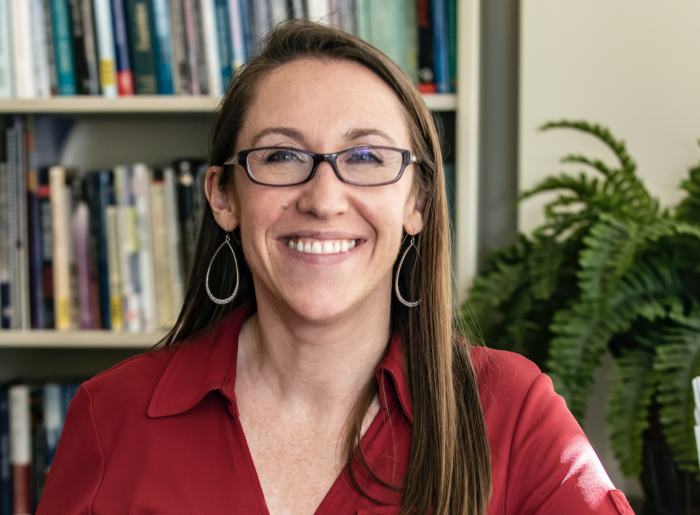 You teach at Boston College School of Social Work and do research with the Center on Aging & Work. What fueled your passion for engagement as we age?
You teach at Boston College School of Social Work and do research with the Center on Aging & Work. What fueled your passion for engagement as we age?
There was a confluence of experiences that led to my interest in engagement in later life, but my personal experience played a large role. I remember being home from college the summer after my grandfather had died. I would come to visit my grandmother on my lunch break at least once a week. Being without my grandfather, who was a large source of her daily social engagement and sense of identity, it was as if she had given her body permission to give out, and I watched as she became increasingly sedentary and insular, month by month. Less than a year later she passed herself. There had to be a better way!

My grandparents: Robert and Phyllis Matz
I became interested in engaged aging and the complex pathways between health, well-being, and engagement during later life. In my opinion, this is a fascinating area that taps some of life’s most powerful questions around purpose, meaning, and legacy in life. When I think back to my grandmother’s story and the stories of those in later life who are socially isolated, under stimulated, and lack a strong sense of purpose, I think, what if somewhere in our development we were taught the importance and value of activity portfolio diversification—the act of seeking out multiple opportunities for engagement in community and social roles that are interest/passion-driven but that also engage us physically, cognitively, and socially? This could help us to lead healthier and happier lives as we age.
Indeed, such a rich portfolio can afford us some protection in the face of age-related social role losses. For example, my colleagues and I recently conducted a study that found that those who acquire a volunteer role after becoming widowed experience a decrease in their sense of loneliness to the point that their loneliness scores were similar to those who had remained continuously married. For more on this study, read here.
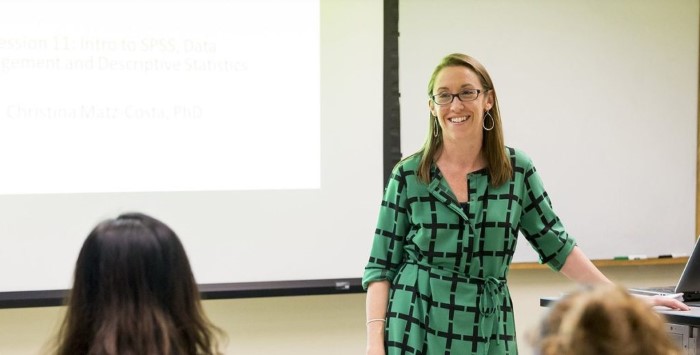
Teaching
What challenges do we face with continued engagement as we get older?
A large body of evidence has accumulated showing the health and well-being effects of meaningful activity engagement in later life—which can include a variety of roles or activities that are personally meaningful like paid work, volunteering for community groups or organizations, informal helping in one’s community, caring for grandchildren, personal enrichment or hobbies, among other activities.
In the research we have done as part of the Engaged as We Age Initiative at the Boston College Center on Aging & Work, we have demonstrated that it is not the quantity of engagement (e.g., number of roles or amount of time spent in roles) that matters for health and well-being, but the quality or subjective experience of one’s involvements. Activities appear to confer health through their effects on physical and cognitive activity levels and social interaction as well as through fostering protective healthy behaviors, self-esteem, and purpose in life.
In other words, it is important not only to engage the body through continued physical activity, movement and strength building, but also to continue to engage the mind by challenging yourself intellectually, and to engage the heart and soul by connecting through relationships, place, and purpose. But in our modern lives, this is certainly easier said than done! Women in particular in midlife are often facing the peak-demand years at work and with their families, and often with not much of a support system in place. Never mind if you are a single parent or are providing care for sick family members or friends. Finding time to ensure that you are living a full, enriching, balanced life is tough. And, unfortunately, teaching individuals the importance and value of activity portfolio diversification is only one part of the puzzle. As a society, we still have a lot of work to do to make sure that meaningful opportunities that fit the needs and preferences of adults in this life stage are available and accessible (read more here).
Are there opportunities to counter those challenges?
I think that women in midlife have the opportunity to help shape and advocate for the changes that they would like to see in society by forging new paths and breaking down age stereotypes.
If I could create a utopia, it would be a world in which age is not seen as a liability but as an asset, where our institutions, infrastructures, policies, and programs are able to adapt quickly to the changing needs and demands of our modern society. A world where work environments and employment policies enable all people to obtain good, quality work across the lifespan and to work longer, if needed or desired. Where caregiving and other forms of care work are properly supported across the lifespan and in later life particularly, so that individuals and families have increased control and choice and reduced stress. Where diverse opportunities exist across the lifespan for individuals to give back to others and their communities and to engage socially.
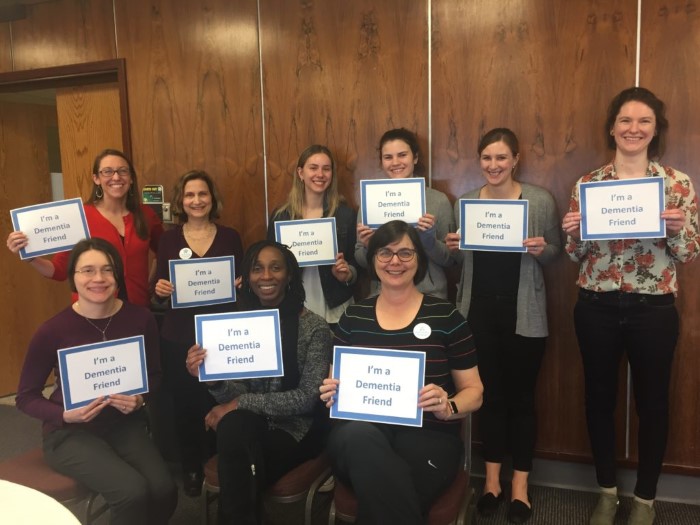
A community event to educate folks around dementia that we held at Boston College
What advice would you give to those who wish to remain productive and fulfilled in our work as we age?
I highly recommend thinking at midlife (or earlier) about “diversifying you activity portfolio” by tapping into or rediscovering those interests or activities in your life that you find most meaningful—that inspire you—that “light you up” and find a way to pursue them. Why? Well, in diversifying our activities (taking on a part-time job, volunteering, helping to solve a community issue) we increase the likelihood of engaging in positive lifestyle behaviors that contribute to health and longevity.
Here are some techniques that you might consider:
- Plan for the psychological and social aspects of retirement by thinking ahead about the transition to retirement, the development of identity, finding meaningful activities, options for generativity, etc., with the same vigor dedicated to planning financially for retirement.
- Develop a strategic plan with a mission, vision, and goals for your life. Identify strengths and interests, building on those to create a strong activity portfolio NOW that you can expand upon in your retirement years. Reach out to local organizations that can help you to achieve these goals and leverage existing resources.
- “Job-craft”: Advocate for yourself in the workplace, identify and follow your strengths, network.
- Develop your skills across the life course, become a lifelong learner, actively seek out training and learning opportunities
- If you’re an employer, facilitate this type of planning by complimenting finance-based retirement planning seminars and workshops with programming that focuses on the non-financial aspects of retirement. Employers can also provide paid time off for employees to volunteer in the community or to “try out” other positions in the organization. This can allow employees to start to widen their activity portfolios and think more concretely about the types of things that they may want to pursue as an “encore” (e.g., Intel’s Encore Fellowship Program).
How have you encouraged women to stay engaged later in life?
I developed and tested a program called Engaged4Life to encourage older adults to embed physical activity, cognitive activity, and social interaction into their everyday lives in contexts that are personally meaningful and natural for them.
In this program, the imagery of a compass navigating “The Road to an Engaged Life” is used as a metaphor and participants are guided through exercises and discussions focused on “continued engagement” as a key component of healthy aging using the 4 compass points for engaged living: Move (PA), Think (CA), Connect (SI), Enrich (PM). Participants are then asked to reflect, through a structured activity, on their current “activity portfolio” (i.e., list the activities they engage in on a day-to-day or weekly basis), and assess the extent to which these activities require them to be physically, cognitively, and socially active, and are personally meaningful. Peer mentors assigned to each group provide support and help with this activity as needed.
In the goal-setting module, participants work in small groups with a peer mentor to set personalized, long and short term goals for themselves focused on either enhancing or supplementing their activity portfolios in ways that increase PA, CA, SI and PM. Participants have broad latitude to choose any type of goal for themselves as long as they feel that goal(s)/activities are personally meaningful and they could find ways to embed PA, CA, and SI within or across the various new or enhanced activities. One woman, for example, decided this would be a good opportunity to rekindle her strained relationship with her daughter. Her short-term goals focused on reaching out to her daughter to make amends and then arranging to meet her daughter and granddaughter for an active outing a couple of days per week. These goals were not only extremely personally meaningful to her, but they also explicitly required increased physical activity (i.e., playing at a playground or going for a walk) and social interaction. Her long-term goal was to maintain a strong, positive relationship with her daughter and granddaughter moving forward and to make these outings an ongoing, regular occurrence.
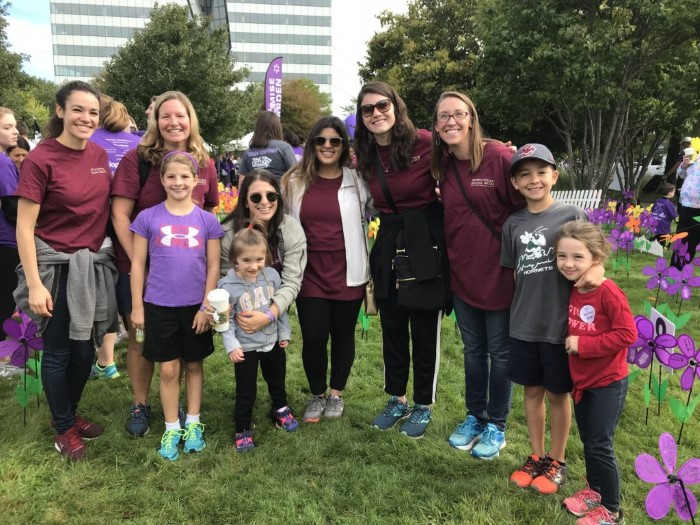
Volunteering at the Walk to End Alzheimer’s with several of my students and my 2 Children
What resources do you recommend?
Books:
How to Live Forever: The Enduring Power of Connecting the Generations, Marc Freedman (2019)
The Big Shift: Navigating the New Stage Beyond Midlife, Marc Freedman (2012)
Encore: Finding Work that Matters in the Second Half of Life, Marc Freedman (2008)
StrengthsFinder 2.0, the Gallup Organization/Tom Rath, to help you determine your strengths and skills, and to see in what ways you might contribute to a volunteer role (2007)
The Encore Career Handbook: How to Make a Living and a Difference in the Second Half of Life, Marci Alboher (2012)
The Blue Zones: 9 Lessons for Living Longer from the People Who’ve Lived the Longest, Dan Buettner (2008)
Websites:
PBS’ Next Avenue a site for people over the age of 50. Its podcast, “Your Next Avenue”, focuses on work and careers after 50.
Encore.org is an innovation hub tapping the talent of people 50+ as a force for good. Visit the Encore Network page to learn about organizations offering people age 50+ new ways to connect work and contribute for the greater good. Encore Fellowships Network offers paid, time-limited fellowships that match skilled, experienced professionals with social-purpose organizations in high-impact assignments.
Connect with Christina Matz
Email: matzch@bc.edu
Twitter: @tmatz @agingandwork
Boston College Center on Aging & Work (CAW), a center of the School of Social Work that focuses on a defining issue of our time: the intersection of aging & work. The Center’s mission is to promote quality and choice of paid and unpaid work across the lifespan, with a particular focus on older adults.
Engaged as We Age initiative of the CAW that focuses on the impact of engagement — in continued work, in volunteer activities, in informal helping, and in caregiving for family members and friends — on the mental and physical health of older people.
Engaged as We Age: Social and Productive Engagement in Later Life a video produced by BC Talks Aging, featuring Christina Matz, that focuses on engaged aging
Relevant Reports and Articles:
Perceptions of the meaningfulness of work among older social purpose workers: An Ecological Momentary Assessment study (2017)
Does becoming a volunteer attenuate loneliness among recently widowed older adults? (2017)
Retirement security: It’s not just about the money (2016)
Through a Different Looking Glass: The Prism of Age (August 2012)
Insights on Activity in Later Life from the Life & Times in an Aging Society Study—Engaged as We Age (January 2012)
The End of Retirement as We Know It?—Engaged as We Age (February 2010)
A Grand Challenge for Social Work: Advance Long and Productive Lives
Christina Matz, MSW, PhD, FGSA, is an Associate Professor in the Boston College School of Social Work where she is Chair of the Older Adults & Families Field-of-Practice, Director of the Spier Fellows in Aging program, and Co-Director of the Center on Aging & Work. Her research focuses on meaningful engagement in later-life and its effects on the health and well-being of individuals, families, organizations, communities, and society. She is a co-lead on the American Academy of Social Work and Social Welfare’s (AASWSW) Grand Challenge focused on “Advancing Long and Productive Lives”. Dr. Matz has co-authored more than 40 scholarly articles/book chapters and numerous reports/issues briefs. She teaches courses in Research Methods and Practice with Older Adults in Home and Community Settings and has facilitated working partnerships with several Boston-area community organizations including the Encore Boston Network, Empower Success Corps, the Waltham Council on Aging, and the Massachusetts Service Alliance.
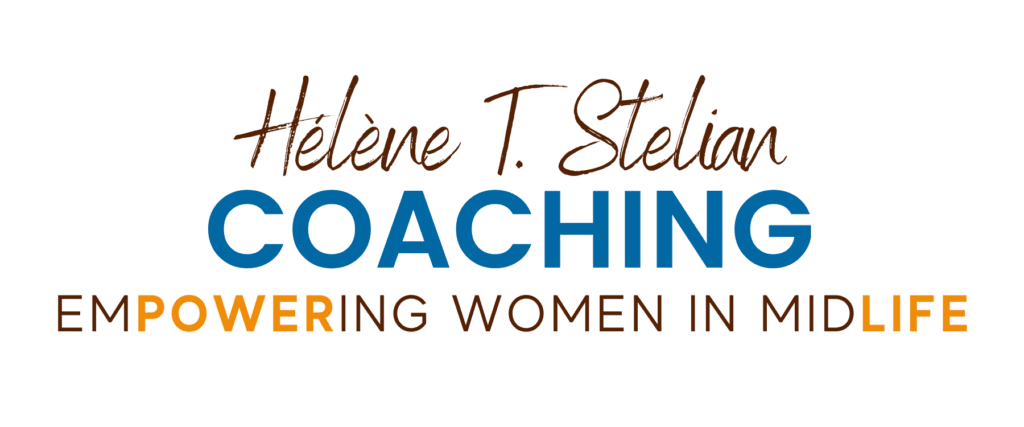
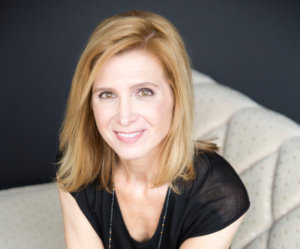
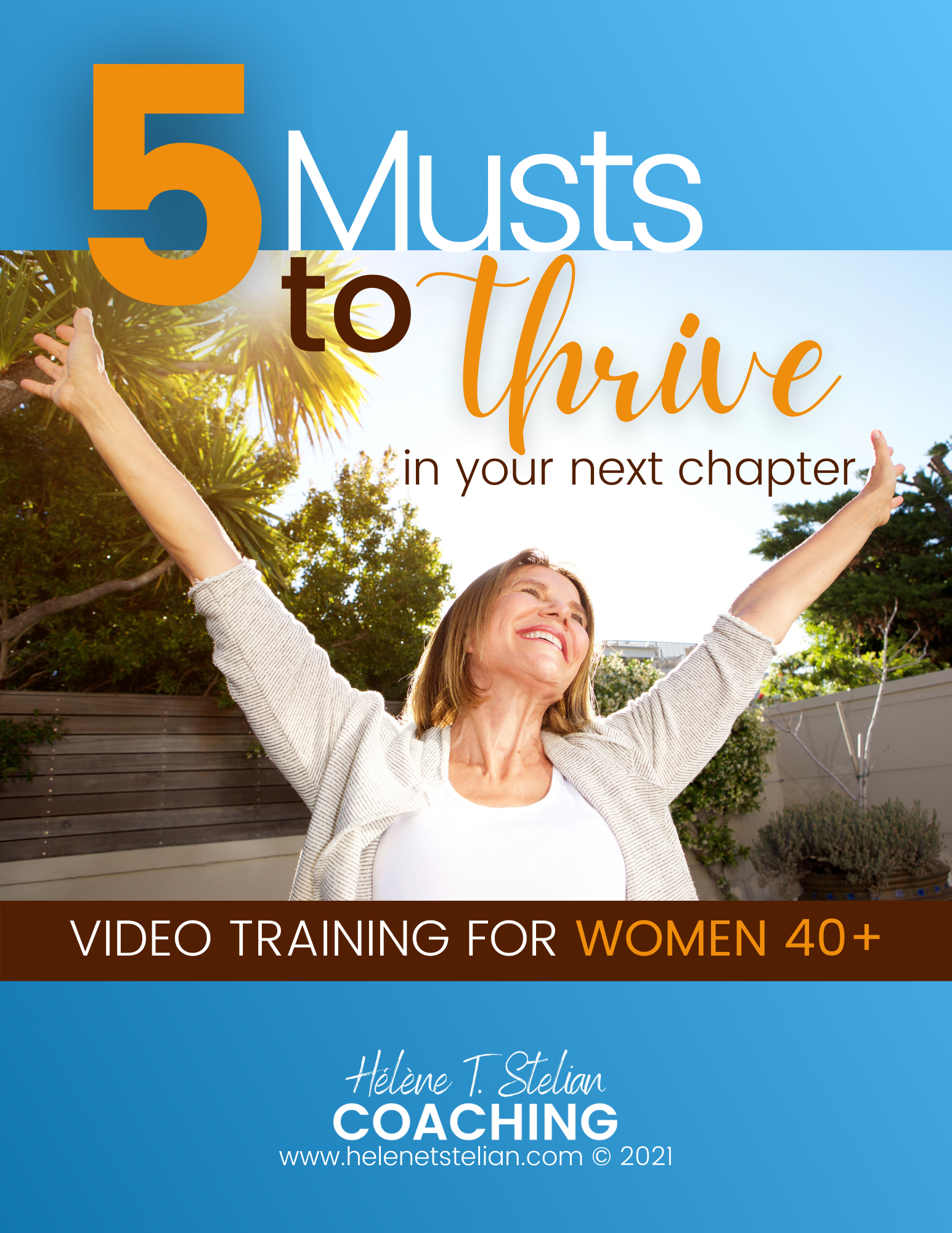



I would be glad to serve as a witness for exactly what you are talking about. At 82, staring my 83rd year next week, I continue to be engaged through a variety of activities – mental, physical, emotional , spiritual and social. I still work part-time, write a blog, travel frequently, and stay in touch with an large extended family and a cadre of friends. We have choices to make life as good as it can be in whatever circumstances we find ourselves, OR in whatever circumstances we might be able to create given our abilities, resources and connections. My grandchildren think I’m cool because I use my iPhone and laptop with some degree of technical competence. It’s not high level stuff but I manage fairly well for my needs and interests. For all of this, I am enormously grateful.
Gary, it sounds like you are a wonderful example of living a full and engaged life! You point out 2 additional domains: emotional and spiritual. I agree- paying attention to and continually fostering our emotional and spiritual development is extremely important too! Another excellent point that you make is that engagement, in part, is a choice that you make every day (just like living a healthy lifestyle, exercising, working hard at our relationships, etc) but it is also partly dependent on the resources we have access to- our abilities, finances, connections, etc. I think there might be creative solutions we can come up with in our communities to be sure that all people have opportunities for meaningful engagement– for instance there is this idea of “time banks” where instead of exchanging money for goods and services the currency is time. Everyone’s time is worth the same as everyone else’s. Someone might offer an hour of reading tutoring to a child in exchange for a hour of someone else’s time to come and install a hand rail in their shower…other ideas??
I would be glad to serve as a witness to what you are talking about and there are many others as well. At 82, starting my 83rd year next week, I continue to be engaged mentally, physically, emotionally, spiritually and socially. I keep a fairly active blog, have published a couple of books, still work part-time, travel frequently and stay connected to a large extended family and a small cadre of friends. My grandchildren think I’m cool because I use my iPhone and MacBook Pro with some degree of technical facility. It’s not high level stuff but sufficient for my needs and interests. We have choices about how we deal with the circumstances in which we find ourselves OR create the circumstances that we can given our abilities, skills, resources and motivation. For all of this, and more, I am enormously grateful.